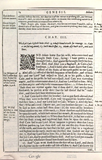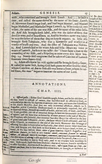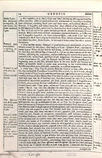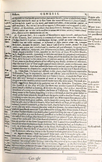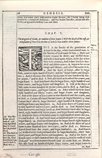Wicked Cain killeth holy Abel: (9) whose blood cryeth for revenge. (11) Cain a cursed vagabond, (17) hath much issue. (25) Adam also hath Seth, and Seth Enos.
AND Adam knew Eve his wife: who conceived and brought forth Cain, saying: I have gotten a man through God. 2And again she brought forth his brother Abel. And Abel was a shepherd, and Cain a husbandman. 3And it befell after many days that Cain • offered of the fruits of the earth gifts to our Lord. 4Abel also [a] offered of the first-begotten of his flock, and of their fat: and our Lord • had respect to Abel, and to his gifts. 5But to Cain, and to his gifts he had not respect: And Cain was exceeding angry, and his countenance abated. 6And our Lord said to him: Why art thou angry? and why is thy countenance fallen? 7If thou do well, • shalt thou not receive again: but if thou dost ill, shall not thy sin forthwith be present at the door? but the lust thereof shall be • under thee, and thou shalt have dominion over it.
8And Caine said to Abel his brother: Let us go forth abroad. And when they were in the field, Caine rose up against his brother Abel, and slew him. 9And our Lord said to Cain: Where is Abel thy brother? Who answered: I know not, am I my brother’s keeper? 10And he said to him: What hast thou done? [b] the voice of thy brother’s blood cries to me out of the earth. 11 Now therefore cursed shalt thou be upon the earth, which hath opened her mouth, and received the blood of thy brother at thy hand. 12When thou shalt till it, it shall not yield to thee her fruit: a rogue and vagabond shalt thou be upon the earth. 13And Cain said to our Lord: Mine iniquity is greater than that I may deserve pardon. 14Lo thou dost cast me out this day from the face of the earth, and from thy face shall I be hid, and I shall be a vagabond and fugitive on the earth: every one therefore that findeth me, shall kill me. 15And our Lord said to him: No, it shall not so be: but whosoever shall kill Cain, shall be punished seven-fold. And our Lord put a mark on Cain, that whosoever found him should not kill him.
16And • Cain went forth from the face of our Lord, and dwelt as a fugitive on the earth at the east side of Eden. 17And Cain knew his wife, who conceived, and brought forth Enoch: And [c] he built a city, and called the name thereof by the name of his son, Enoch. 18Moreover Enoch begat Irad, and Irad begat Mauiael, and Mauiael begat Mathusael, and Mathusael begat Lamech. 19Who took [d] two wives, the name of the one was Ada, and the name of the other Sella. 20And Ada brought forth Jabel, who was the father of them that dwell in tents, and of herdsmen. 21And his brother’s name was Jubal: he was the father of them that sing on harp and organs. 22Sella also brought forth Tubalcain, who was a hammerer and worker in all work of brass and iron. And the sister of Tubalcain was Noema. 23And Lamech said to his wives Ada and Sella: Hear my voice ye wives of Lamech, harken to my talk: for • I have slain a man to the wounding of myself, and a stripling to mine own dry blow bruising. 24Seven-fold vengeance shall be taken of Cain: but of Lamech seventy times seven-fold.
25Adam also knew his wife again: and she brought forth a son, and called his name Seth, saying: God hath given me other seed for Abel, whom Cain slew. 26But to Seth also was born a son, whom he called Enos, this man • began to invocate the name of our Lord.
ANNOTATIONS. CHAP. IV.
↑ 3. Offered gifts.) Either God himself taught Adam, and he his children, or else they knew by instinct of nature, that Sacrifice must be offered to God, to acknowledge thereby his supreme dominion over man, and man’s due subjection to his divine Majesty. And that not only in internal affection, which (as St. Augustin, and all Catholic Doctors teach) is principally required, but also in external things, because we consist of body, and not only of soul, and have, by God’s goodness, the use of corporal things. As here we see example in the law of nature: and the same was ordained by written precept in the law of Moyses: the Prophets also foretold, that external Sacrifice should be offered in the law of grace and new Testament, to wit, the same which Christ instituted, and left in his Church, to continue to the end of the world. Moreover this homage of offering Sacrifice is so peculiar to God only, that even though many other exterior rites and services are used both to God and men, as to be bare-head, to bow, to kneel, and the like before them, either of great humility (says St. Augustin) or of pestiferous flattery, to such as are homines colendi, venerandi, si autem eis multum additur, et adorandi: men to be worshipped, reverenced and of much be given them, adored (for this term of adoring is also applied to men in holy Scriptures Gen 23:7, 27:29), yet Sacrifice is due to God only, and to no creature how excellent so ever. In so much (says the same Doctor) that as all nations found it necessary to offer Sacrifice, so none durst sacrifice to any nisi ei, quem Deum aut scivit, aut putavit, aut finxit; but to him whom they either knew, or thought, or fained to be God.
↑ 4. Had respect to Abel.) Both Cain and Abel did well in offering external Sacrifice, but they differed much in sincerity and manner of choosing or dividing their oblations, touching God’s part and their own, as St. Justinus Martyr, St. Hierom, St. Augustin and others teach. For Abel offered of the best things, of the first-begotten of his flock, and of their fat. And therefore God respected and approved it. But to Cain and to his gifts he had not respect, because he wanted sincere devotion. Which difference of God’s acceptance appeared doubtless, as St. Hierom and St. Augustin supposed, by some external sign, otherwise Cain had not understood it. Most like it was by fire sent from God, which inflamed and consumed Abel’s Sacrifice, and not Cain’s. As we read of diverse other Sacrifices in holy Scriptures.
↑7. Shall you not receive.) Reward of good works and punishment of evil are clearly proved by this place, God saying to Cain: If thou dost well, shalt thou not receive again? What else but well for well doing, as Abel received consolation of his Sacrifice well offered. But if thou dost ill, shalt not thy sin be present forthwith at the door, afflicting thy conscience, and not suffering thy mind to be in quiet, for remorse of thy wicked fact, and fear of just judgement? For hence it came that Cain’s countenance fell, and his stomach boiled with anger: punishment so beginning even in this life, and much more in the next world our Saviour will render (as himself saith) to every man according to his works: which the Apostle expresseth more distinctly, eternal life, or wrath and indignation.
↑ 7. Under thee.) This Text so plainly showeth free-will in man, also after his fall, that the English Protestants to avoid so clear a truth, for these words, the lust thereof (to wit of sin) shall be under thee, and thou shalt have dominion over it, corruptly translate in some of their Bibles thus: Unto thee his desire shall be subject, and thou shalt rule over him. As if God had said, that Abel should be under Cain. As the fantastical Manichees perverted the sense, whose absurdity St. Augustin controlleth, maintaining the true construction of the words, Tu dominaberis illius; nunquid fratris? Absit. Cuius igitur nisi peccati? Thou shalt rule over; what, over thy brother? Not so. Over what then, but sin? In other English Editions, namely in the last, which we suppose they will stand to, it is better, but yet obscure thus, Unto thee shall be the desire thereof, and thou shalt have rule of it. Let us therefore examine the sense, and if St. Hierome, the great scripture Doctor did rightly understand it, God did speak to this effect to Cain: Because thou hast free-will, I warn thee, that sin have not dominion over thee, but thou over sin. The Hebrew hath thus: ad te appetitus eius, et tu dominaberis in eum, or, ei. Unto thee the appetite thereof, and thou shalt rule over it. Thargum Hierosolymitanum concludeth God’s speech to Cain thus: Into thy hand I have given power of thy concupiscence, and have thou dominion thereof: whether thou wilt to good or to evil. The Greek hath thus: To thee is the conversion thereof, and thou shalt bear rule over it: to wit, appetite, lust, concupiscence is under thy will. Finally, all antiquity, universality, and uniform consent of Christian Doctors, and other learned Philosophers, and reasonable men hold it for certain and an evident truth, that man, yea a sinner, hath free-will. Yet Luther, the father of Protestants, so abhorred this truth, that he could not abide the very word, nor vouchsafe (when he wrote against it) to title his beastly book, Contra liberum arbitrium, Against free-will: but, De servo arbitrio, Of servile arbitriment. And denieth that man is in anywise free to choose, to resolve, or determine, but in all things servile, tied, constrained, and compelled to whatsoever he doth, saith, or thinketh. Further, that man in all his actions is like to a hackney, that is, forced to go whither the rider will have him. And knowing the whole world against him, shameth not to confess, that he setteth them all at naught in respect of himself, concluding thus: I have not (saith he) conferred with any in this book, but I have affirmed, and I do affirm. Neither will I that any man judge hereof, but I counsel all to obey, or yield to my opinion. Calvin also for his part conspireth in this heresy with Luther, but more faintly, rather wisheth than imagines that men be so mad as to flee from the name of free-will. I (saith Calvin) neither myself would use this word, and would wish others, if they ask me counsel, to abstain from it. But we will be bold to oppose St. Hierome’s reason against Luther, Calvin, all Manichees, and others that deny free-will. God made us (saith he) with free-will, neither are we drawn by necessity to virtues nor to vices; otherwise where is necessity, there is neither damnation nor crown.
↑ 16. Cain went forth.) It is a mark of Heretics to make breach, and go forth of the Church. And commonly it cometh of envy. Some run into heresies and schisms (saith St. Cyprian) when they envy Bishops, whilst one either complaineth that himself was not rather ordained, or disdaineth to suffer another above him. Hereupon he kicketh, hereupon he rebelleth. Envy moved Cain to kill his brother, because his own works were wicked and rejected: and his brother’s just, and esteemed. So going forth became obstinate, obdurate, and desperate in his sin, and being reprobate of God, began a wicked City, opposite to the City of God. Wherefore Moyses, as St. Augustin noteth, intending to describe and show the perpetual continuance of God’s City, the true Church, from Adam, which he doth by the line of Seth to Noe, and so forward to his own time, would not omit to tell also the progeny of Cain, even to the flood, wherein all his offspring was finally drowned and destroyed, that the true City of God might appear more distinct, more conspicuous, and more renowned. And that indeed the same only (and not any broken and interrupted companies or conventicles) might be known to be the true Church of God.
↑ 23. I have slain.) So hard and obscure is this place, that St. Hierom required by St. Damasus Pope to expound it, dareth not affirm any one sense for certain, but proposing diverse which the text may seem to bear, wisheth the Pope (who was also very learned) to examine all more at large: putting him in mind that Origen wrote his twelfth and thirteenth books upon this only place. The most probable exposition seemeth to be gathered out of the Hebrews’ Tradition, that this Lamech of the issue of Cain (for there was another Lamech of Seth’s progeny) much addicted to hunting, and his eyes decaying, used in that exercise the direction of a young man his nephew, the son of Tubalcain. Who seeing something move in bushes, supposing it to be a wild beast, willed his grand-father to shoot at the same: which he did, and struck the mark with a deadly wound, and approaching to take the prey, found it to be old Cain. Whereupon sore amazed, afflicted, and moved with great passion, did so beat the young man, for his ill direction, that he also died of the dry blows. After both which mishaps, and his passion at last calmed, Lamech lamenteth, as the text says, that he had killed a man and stripling, to wit, the one with a wound, the other with dry blows, for which he feared sevenfold punishment more then Cain suffered for killing Abel. Nevertheless St. Hierom and other Fathers think it probable, that Lamech killing the one of ignorance, the other in passion, was not so severely punished as he feared. And so they understand the rest of this passage, that sevenfold vengeance was taken of Cain, by prolongation of his miserable life until his seventh generation, when one of his own issue slayed him, and another of the same lineage with him. And Lamech was punished seventy sevenfold when his seventy seven children (for so many he had, as Josephus writeth), and all their offspring perished in the flood. Mystically by seventy seven may be signified that the sin of mankind should be punished and expiated in Christ our Redeemer, who was born in the seventy seventh generation from Adam.
↑ 26. Began to invocate.) Seth was a most holy man, and so brought up his children, that they were called the sons of God, Gen. 6. Adam also and Eve were penitent, and became great Confessors, and are now Saints. And so it can not be doubted but amongst other spiritual exercises they prayed and invocated God. And therefore that which is here said: He (to wit Enos) began or (as the Hebrew hath) then was begun, to invocate the name of our Lord, can not be understood of private, but of some public prayer of many meeting together, and observing some rites and set form in peculiar place dedicated to divine Service, the Church being now grown to a competent multitude; And that besides Sacrifice, which was also before, as appeareth both by Cain and Abel.
Footnotes
- ^ A figure of the Lamb that was slain from the beginning of the world, Apoc. 13:8.
- ^ Wilful murder is one of the sins that cry to God for revenge.
- ^ By the increase of Abraham’s seed (by the line only of Isaac and Jacob, besides the issues of Ismael and Esau) in little more than 400 years to above six hundred thousand men able to bear arms (Num. 1.) it appears that Caine’s progeny in as many years might suffice to people a city, yea a whole country, St. Aug. li. 15. civit. ch. 8.
- ^ This Lamech of Cain’s issue, is the first that is noted in Scripture to have taken two wives.
Margin Notes
- annot. 1. offered gifts.
- External Sacrifice due to God in in every Law.
- Sacrifice due to God only, and to no creature.
- annot. 4. had respect to Abel. Abel’s Sacrifice declared acceptable, and not Cains, by some external sign.
- annot. 7. shall not thou receive. Reward and punishment according to our works.
- annot. 7. under thee.
- Free-will in man, also after his fall.
- Heretical translation.
- The Hebrew also and Greek text prove free-will in Cain.
- Free-will testified by antiquity, universality, and consent of learned and reasonable persons.
- Luther abhorred the name of free-will.
- Calvin also misliketh the word free-will.
- Where there is necessity there is neither reward nor punishment due.
- annot. 16. Cain went forth. Going forth of the Church a mark of Heretics.
- annot. 23. I have slain
- Scripture hard.
- A probably sense according to Hebrews tradition.
- Mystical sense.
- annot. 26. began to invocate. Public prayer besides Sacrifice in the Church of God.
Margin References
- 4. Heb. 11.
- 8.
- Sap. 10.
- 1. Jo. 3
- annot. 1. offered gifts.
- Lib. 10. de civit ch. 5.
- Levit. 1.
- Dan. 12
- Mal. 1.
- Luc. 22.
- Lib. 10 de civit. cap. 4.
- Aristot. li. 2. Metaphis. Ethic. 9. Polit. 7. ch. 8.
- annot. 4. had respect to Abel.
- To. 3. q. 4. Quaest Hebraic Lib 15. civit. ch. 7. Mala. 1.
- Hebr. 11.
- Levit. 9.
- Judic. 6.
- 2. Par. 7.
- 2. Reg. 18.
- 2 Mac. 1.
- annot. 7. shall not thou receive.
- Mat. 16.
- Rom. 2.
- annot. 7. under thee.
- Bible 1579.
- Lib. 15. ch. 7. civit.
- Quaest Hebraic in Gen.
- St. Aug. li. de vera Rel. ca. 14.
- lib. de servo arbitrio.
- lib. 2 ch. 2 Par. 8.
- lib. 2 adv. Jovinian.
- annot. 16. Cain went forth.
- 1. Joan. 2
- Tra. de Zelo & livore.
- 1. Joan. 3.
- li. de Pastore. ch. 8. & ch. 20.
- annot. 23. I have slain.
- Tom 3. ad 1. quaest. Damasi.
- St. Chris. ho. 20. in Gen.
- Lib. 1. Antiq. ca. 2.
- Origen in Gen.
- Luc. 3.
- annot. 26. began to invocate.
- Suidas vocabulo Seth. Joseph. li. 1. Anti.
- St. Aug. epist. 99. ad Evod.
